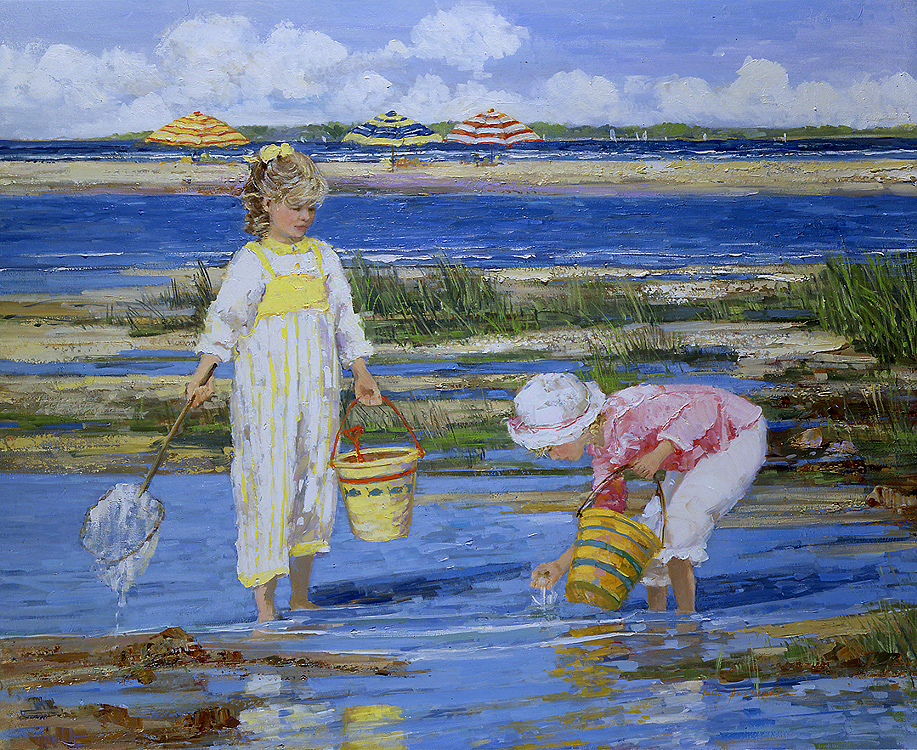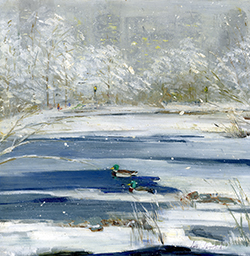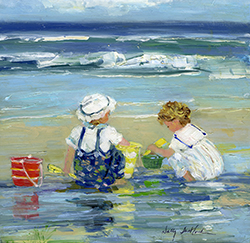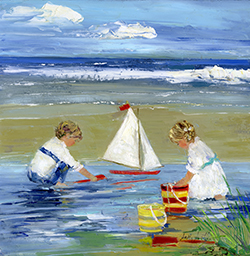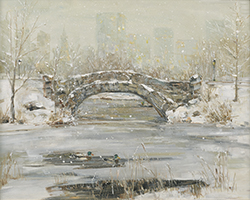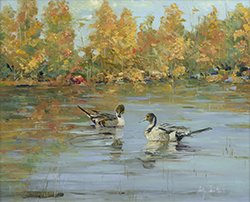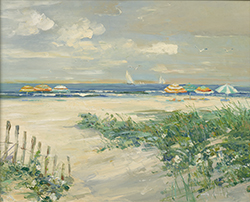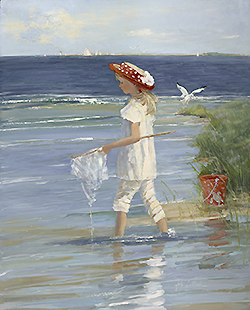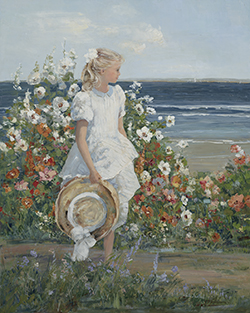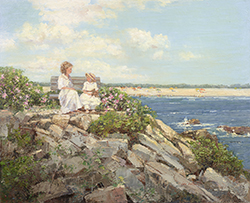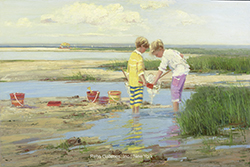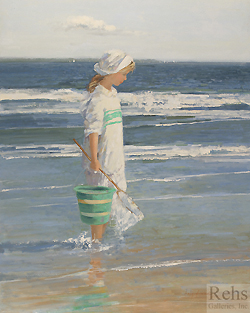Sally Swatland
(Born 1946)
Playing in the Cove
Oil on canvas
26 x 32 inches
Signed
BIOGRAPHY - Sally Swatland (Born 1946)
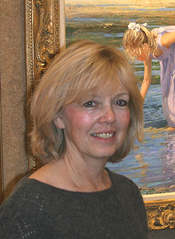
Images of the sea have long captivated our imagination and have been a popular source of inspiration for artists who have found a sympathetic audience with their work. Contemporarily, Sally Swatland’s images of young children playing on the beaches are tinged with a sense of nostalgia that reminds us of a bygone time, when a day at the beach offered respite from the busyness of daily life. Her sensitive images evoke the reminiscences of a period when life was uncomplicated and happiness was found in the simplest of activities. This is just one of the aspects of Sally’s work that audiences are drawn to - the sense that through her pictures one can retreat into the past. Her light-filled palette of rich colors also expresses the richness of a flowering garden and the breeze of a summer day. Her work has become highly sought after for these qualities which are inherent in her work.
Sally was born on September 20th, 1946 in Washington, D.C. She grew up in a family that appreciated the arts; her grandmother was a concert violinist, her aunt was a talented artist, and her mother played piano and sang in several choirs. Drawing was second nature to Sally, and she began painting when she was just five years old. Sally had two sisters who were also encouraged to study drawing, painting, and anything that developed creative expression. She always knew that she wanted to become an artist; it was perhaps not so much a decision as a general instinct which guided her. Her family encouraged her natural talents by buying her paints and easels.
At the age of seven her family moved to Greenwich, Connecticut where they spent long periods in the country and at various seaside locations. She remained in Greenwich most of her life, relocating just within the last decade. Most summer days were spent at Todd's Point on Long Island Sound, playing in tidal pools, chasing minnows, collecting shells and exploring. The entire family shared a passion for the beaches, sunshine, and fresh air.
Throughout her childhood and teens Sally was always painting and drawing, developing her skill of observation while recording the world around her. In both grammar school and high school, she enrolled in art classes in which she experimented with new techniques and media. She chose her high school specifically because of its art department, where her first lessons were in charcoal, pastel, and oil. By graduation she had excelled to the point where she was given the art award for her graduating class.
In 1964 Sally entered Mount Saint Vincent College in Riverdale, New York as an art major. During her last year (1968) she asked a family friend, Frank Swatland, to accompany her to the senior dance. Since Frank attended boarding school in Connecticut, he and Sally established and maintained a mutual, but casual, friendship during their youth; only seeing each other during the Christmas holidays. After her dance, the two parted ways. But a chance meeting just six months later brought them together again. They began dating in 1969 while Frank was living in White Plains, and spent many weekends in both New England and New York City’s Central Park taking photographs that Sally would use for inspiration.
While spending time with Frank in New York, her desire to become an artist grew and she search of further training which would complement and enhance her previous studies. This same year, 1969, she entered the Art Students League of New York, taking the train in every day to attend classes. There she studied formal figure and portrait drawing and painting for six years under the direction of Robert Schulz - an illustrator who continued Norman Rockwell's tradition and became famous for his illustrations that graced the covers of many Zane Gray books. Schulz used a thoroughly academic approach to his painting that was based on the Frank Reilly method – Reilly was an illustrator and highly regarded teacher who worked during the fifties and sixties. Each of the students first perfected their drawing techniques before progressing to monochromatic wash-ins, or what is also referred to as grisaille. This method allowed students to establish the drawing values and planes before adding color. The Reilly method was a structured and disciplined way of teaching which allowed the student to gauge progress and reach their goals. During the summer months Schulz also held numerous plein-air landscape-painting classes in the New Jersey countryside where Sally would drive long distances to attend. These classes taught her to observe nature and how atmosphere affects objects and color. Continually inspired by her surroundings, these studies were integral to the formation of her choice themes and subjects.
Sally and Frank continued to date during these busy months of her study at the Art Students League. The two married just one year later in 1970 in Greenwich, Connecticut and made their home in White Plains, New York. Sally remained devoted to her artistic studies and received constant encouragement from Frank.
In the early 1970s, Sally approached her local Saks Fifth Avenue store to inquire about their exhibition space. She was granted her first show, where she exhibited a group of flower, landscape and figure paintings. The results were positive – she sold many of the works on display.
After staging her first solo show, her career and studies began to advance. At school she had become a monitor; an honor given to the more talented and advanced students who were responsible for running the classes while the teachers were away. Her responsibilities included setting up models, preparing students for the day’s assignments, helping them get started and answering questions. In her own personal style and work, Sally was still in an experimental phase, not yet having decided just what theme to pursue. She had received an extensive amount of training in both figure and landscape painting and had been introduced to several different approaches; but she was in search of her own style and audience. Sally enjoyed the freedom painting granted her, especially oils as they could be manipulated for various effects. She also realized that illustration was not her niche since it required an overly demanding lifestyle that would have probably prohibited her from experimenting so freely with her own work and style. Soon enough she recognized that her choice theme was exactly where she had spent so much time growing up; the beach.
One sunny summer afternoon, while relaxing with her mother at Todd's Point, Sally decided to snap some photos of children playing in the puddles, capturing the relationship between them and how they played. Sally describes it, “The beach is a perfect place to capture children and their relationships because they are carefree, intense, and happy. I spent many days and years on the beach, I have visual memories of the water, sand, and atmosphere.” Since she was unable to paint at that moment, but she took the time to absorb her surroundings, memorizing and studying the water, sand, reflections, and the atmosphere. At home she used these photos and her experiences to execute a small painting and showed it to friends who liked the feeling of the painting. She had found her subject, one that equally had a personal meaning and a freshness of atmosphere.
1975 proved to be a pivotal year for her career. She concluded her studies at the Art Students League when her first daughter, Noelle, was born. This same year she was introduced to Alistair Stair whose gallery, The Incurable Collector, was located in both New York City and Palm Beach. He loved her small beach studies to which she had recently become more interested in, and displayed and sold her pictures in his Florida gallery. The two continued to work together throughout the 1970s. Her young daughter Noelle became one of her favorite models for these compositions.
Though living in New York at this time, Sally still had strong roots in Connecticut and often returned to visit her parents. In 1976 Sally was introduced by her mother to a local Greenwich entrepreneur/businessman who owned a local gift shop. He took a liking to her work and offered Sally a yearly Mother’s Day exhibition where she could show some of her beach and figural paintings. It was through the contacts made at these shows that Sally began receiving portrait commissions. The following year Sally and Frank moved back to Greenwich, where she began to see success with her yearly exhibitions and commissions.
Clearly, Sally had found her subjects and an audience for them - views of children playing on the beach or in a lush garden, one that had a personal meaning and a freshness of atmosphere. Her favorite images were of children playing in tidal pools, yielding light filled and colorful reflections. As her children grew older – her second daughter Katie was born in 1981 – the family traveled to discover other beaches. They spent a good deal of time on the West Coast exploring the coastal communities of California from Newport Beach to Laguna down to Del Mar. On the East Coast, they enjoyed the beaches of Maine down the North Shore of Massachusetts and over to Cape Cod. The beaches became an important and inspirational part of their family life.
For much of the 1980s, Sally concentrated on her family, spending a great deal of time with her children. She continued with her portrait commissions and dabbled in capturing her young models playing on the beaches and gardens they visited. Her camera continued to be an important recorder for her paintings. She spent many summer days at the beaches and gardens around Greenwich where she would take her daughters and their friends and photograph them. She would capture children on film in all types of beach and garden activities. There was a significant amount of bribery that went on between Sally and her children so that they would cooperate in what she now calls her 'beach dress up photo archives'. The children knew it was a way to acquire further summer treats and gain extra benefits - it was all quite amusing to Sally.
She carried a variety of colorful clothing and an assortment of hats, spending a considerable amount of time searching for the right apparel. The right umbrella, beach bag, sash, or chair might bring an added touch of color to the painting. Her beach photo sessions, in particular, would always draw a crowd, especially the young children; allowing her access to even more models. Because of the strong relationship between Sally and her subjects, her paintings evoke a more personal reflection.
Her success and images continued to proliferate. In 1986 she had a chance meeting with the owners of Caspari - a greeting card company located in New York. This turned into a job and over the next 14 years she created more than 150 original designs that were used on numerous greeting cards. She kept very busy creating these compositions and through numerous personal and professional contacts was becoming a much sought after portrait painter.
For the next 15 years Sally continued designing cards and completing her portrait commissions. Then in 2001 Sally’s husband, Frank, was searching for information on marketing Sally’s work to a wider audience and while surfing the Internet he came across the Rehs Galleries, Inc. web site. Frank called the gallery and during a lengthy conversation sparked their interest. An initial meeting was set up, one that would set the wheels in motion, creating another pivotal point in Sally’s career. The owners of the gallery were not only impressed with Sally’s artistic talent, but her ability to capture the subjects emotionally and convincingly … they immediately agreed to market her work exclusively.
While Sally has, and still often paints from her studio, she relies less on her photographs and more on plein-air painting, which captures more fully the coloristic nuances of the atmosphere and light. So often has she sat at the beach or a local garden, looking for new subjects and inspiration that she almost no longer needs to rely on photographs for execution of her paintings; instead it has become second nature to her. She knows the water and flora so well that she can rely on her senses. Often she executes small paintings en plein-air and then pieces them together to complete an entire composition. It is not difficult to find her inspiration for this type of painting since her favorite artists are the earlier American and European Impressionists, and her attraction lie in their use of bright, light color. She defines her style as “Realism with Impressionism” since her main goal is to tell a story and to show the relationship between the figures in her work, offering an emotional appeal to her audiences. Still, Sally is not confined to any set method and prefers instead to experiment with different styles, techniques, and approaches. Her style is all her own, gleaned from personal experiences, joys, and relationships.
Even though her work is based on summer scenes filled with the bright summer sunshine, Sally works diligently throughout the year. In her early career she completed commissioned portraits during the winter months, with most of her work coming from referrals, but remained a student of the summer scenes and now concentrates on these throughout the year. Sally uses her extensive “dress up photo archives” as inspiration for her warm and colorful images of childhood.
While Sally has devoted much time to her themes and subjects, she continues to search for new methods of painting, studying the practices of the Old and New Masters. She is always looking for ways to expand her style and oeuvre, and this is what inspires her to continue her work. She says that “art is a constant learning experience.” Her devotion to her art is apparent in her works. Her husband reflected upon her work when he wrote that “Going to the beach with children was so rewarding to her. Children would interact with her…so well. That is one reason why I feel there is so much emotion in her paintings. Other mothers and fathers must relate to these summer experiences.” She also shares her own feelings about why she does art, saying that “I can translate my ideas, feelings and emotions to canvas and share them with people who enjoy my work.” Sally has clearly done just that, imbuing her compositions with a sense of intimateness and personal reflection which have brought her an audience who appreciates her work for the coloristic and emotional qualities conveyed by her choice of imagery.
Sally has exhibited with a number of national organizations including Oil Painters of America, Catharine Lorillard Wolfe Art Club, Hudson Valley Art Association, and the American Society of Marine Artists. At the 11th Annual Marine Art Exhibit at the Coos Art Museum her painting Newport Surf won an Award of Merit and was runner up for the People’s Choice Award. At the Cape Cod Art Association’s Open Juried Spring Exhibition Todd’s Point received the Second Award and at their 2004 New England Exhibition Noelle was awarded the Second Prize in Oil. At the Catharine Lorillard Wolfe Art Club's 108th Annual Open Exhibition, Todd's Point was again singled out and awarded the Gold Medal of Honor.
Sally is currently a member of the Copley Society; American Society of Marine Artists; American Impressionist Society; Oil Painters of America and the Cape Cod Art Association.
In the 1990s Sally was selected from a number of Connecticut artists to paint the Governor’s Christmas card for two years. Throughout her career she has been involved with numerous charities; these include the American Cancer Society, Sloan Kettering; Saint Thomas More Church; Greenwich Lyme Association; Brunswick School; Greenwich Academy; and the Putnam Indian Field School.
| AVAILABLE WORKS | ||||||||||||

